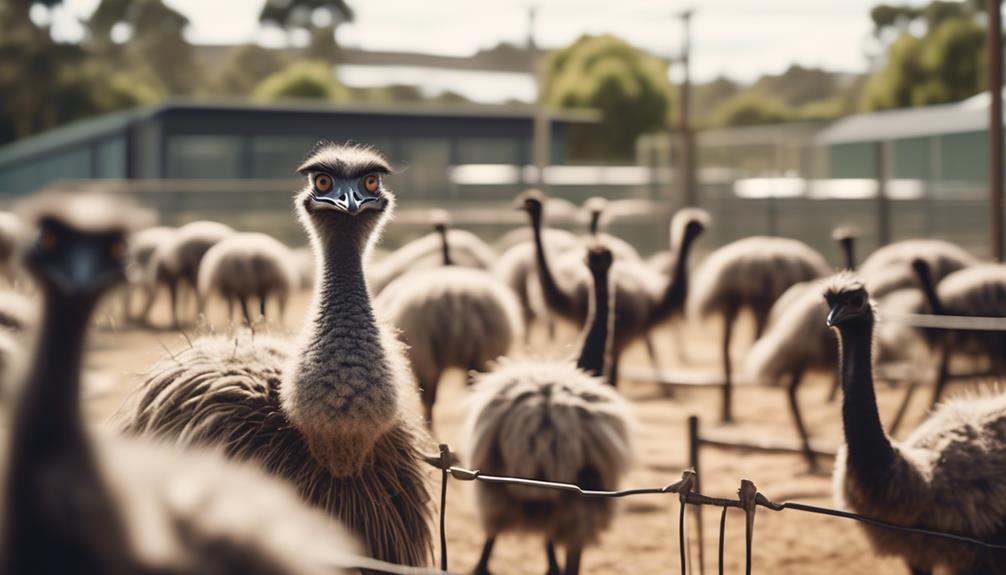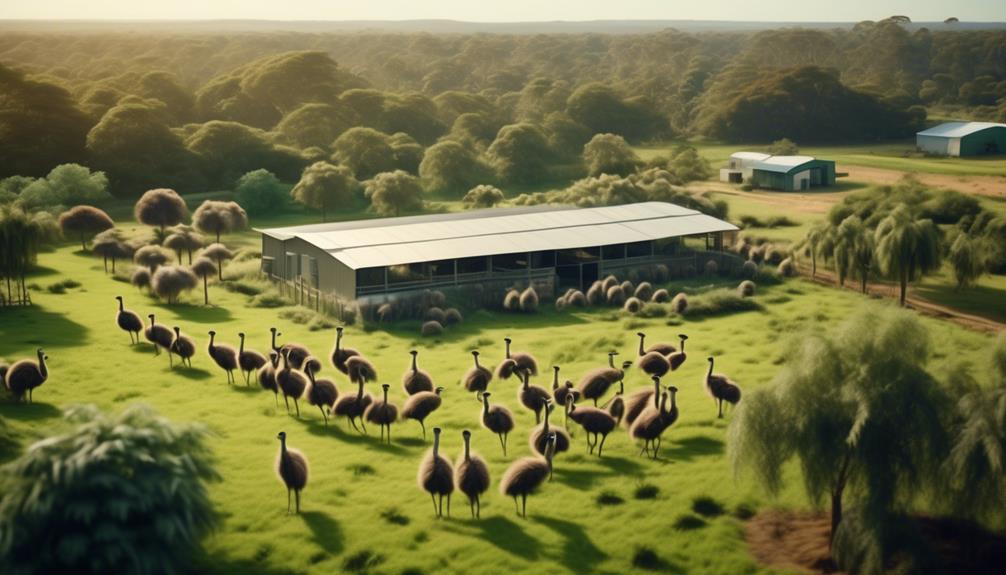
Are you tired of struggling to make your emu farming venture profitable? Look no further, as this discussion will provide you with valuable business strategies and tips to turn your emu farm into a lucrative enterprise.
Imagine the story of John, a small-scale emu farmer who, by implementing these strategies, was able to increase his profits by 50% within just one year. Intrigued?
Let's explore the key factors that can make or break the success of your emu farming business.
Understand the Emu Market

To understand the Emu market, it's crucial to analyze current trends and gather relevant information to make informed decisions about farming these unique birds. Emu farming is a growing industry that offers potential for profitability, but it's important to be aware of the market trends and challenges associated with it.
One of the key trends in the Emu market is the increasing demand for Emu products. Emu oil, meat, and feathers are sought after for their various benefits and uses. Emu oil, in particular, has gained popularity in the cosmetics and pharmaceutical industries due to its anti-inflammatory and moisturizing properties. This growing demand presents a significant opportunity for Emu farmers to capitalize on the market and generate income.
However, it's important to recognize the challenges that come with Emu farming. One of the main challenges is the initial investment required to set up an Emu farm. Emus require specialized facilities and infrastructure, including secure fencing, shelters, and feeding areas. Additionally, Emus have specific dietary needs, and their health and well-being must be carefully monitored.
Develop a Solid Business Plan
Developing a solid business plan is an essential step for anyone looking to enter the emu farming industry and ensure long-term success.
With a well-crafted plan, you can effectively navigate the challenges and uncertainties that come with running an emu farm.
One crucial aspect of your business plan should be to develop a financial forecast. This involves projecting your expected income and expenses over a specific period, usually one to five years. By carefully analyzing the market trends and potential growth opportunities, you can make informed decisions about pricing, production levels, and marketing strategies.
Additionally, it's vital to assess potential risks that may impact your emu farming business. These risks can include fluctuations in feed prices, disease outbreaks, or changes in consumer demand. By identifying these risks early on, you can develop contingency plans to mitigate their impact and safeguard your business.
Your business plan should also include strategies for marketing and sales, operational procedures, and a detailed budget.
Choose the Right Location for Your Emu Farm

When it comes to establishing a successful emu farming business, one of the crucial factors to consider is selecting the optimal location for your farm. The right location can significantly impact the profitability and sustainability of your venture. Several factors must be taken into account when choosing the site for your emu farm.
To help you make an informed decision, consider the following factors affecting emu farm location:
| Factors to Consider | Importance |
|---|---|
| Climate | High |
| Land Availability | High |
| Accessibility | Medium |
| Market Proximity | Medium |
Climate: Emus thrive in temperate climates, so it is essential to choose a location with suitable weather conditions. Ensure that the average temperature, rainfall, and humidity levels are ideal for emu rearing.
Land Availability: Emus require ample space to roam and forage. Look for locations with sufficient land availability to accommodate their natural behavior and ensure their well-being.
Accessibility: Select a location with good road connectivity to facilitate easy transportation of emus and their products. This will also help in attracting potential customers and suppliers.
Market Proximity: Consider the proximity of your farm to potential markets. Being closer to your target audience will reduce transportation costs and ensure fresh products reach the market quickly.
Invest in Quality Emu Stock
Investing in high-quality emu stock is essential for the success and profitability of your emu farming business. Emu breeding plays a crucial role in ensuring that you have a healthy and productive flock. When it comes to selecting emu stock, it's important to consider factors such as genetic quality, health history, and productivity potential.
To begin with, look for emus that come from reputable breeders who prioritize genetic diversity and optimal breeding practices. This will ensure that you have a diverse gene pool, which is important for the long-term health and vitality of your flock. Additionally, consider the health history of the emus you're considering. Look for birds that have been consistently healthy, with no major health issues or genetic disorders.
In terms of productivity potential, focus on emus that have a proven track record of high egg production and successful hatching rates. This will maximize your chances of producing healthy chicks and ultimately increase your profitability. Keep in mind that the emu meat market is growing steadily, so investing in emus with desirable meat traits, such as good muscle development and low fat content, can also enhance your business prospects.
Implement Effective Marketing Strategies

To effectively market your high-quality emu stock and maximize profitability, it's crucial to implement strategic marketing strategies that showcase the unique benefits and advantages of your emus to potential customers.
One effective way to reach a wide audience is through social media promotions. Utilize platforms such as Facebook, Instagram, and Twitter to create engaging content that highlights the health benefits of emu products, the sustainability of emu farming, and the superior quality of your emus. Post regular updates about your farm, share success stories from satisfied customers, and offer exclusive discounts to your followers. This won't only increase brand awareness but also encourage customer loyalty.
In addition to social media promotions, targeted advertising campaigns can help you reach specific demographics that are more likely to be interested in purchasing emu products. Consider partnering with local health and wellness stores, gyms, and natural food markets to display your emu products and offer samples. Collaborate with influencers in the health and wellness industry who can endorse your emu products to their followers. This will help build credibility and trust in your brand.
Remember to constantly analyze the effectiveness of your marketing strategies and make adjustments as needed. Monitor engagement and conversion rates, gather feedback from customers, and stay updated on industry trends. By implementing effective marketing strategies, you can increase awareness of your emu products, attract more customers, and ultimately boost profitability.
Optimize Operational Costs
Optimizing operational costs is essential for ensuring the profitability and long-term success of your emu farming business. In order to reduce expenses and increase efficiency, there are several practical strategies you can implement.
First and foremost, it's important to carefully analyze your current expenses and identify areas where cost-cutting measures can be implemented. Look for opportunities to streamline operations and eliminate any unnecessary expenditures. For example, you could consider outsourcing certain tasks or renegotiating contracts with suppliers to secure better deals.
Another way to optimize operational costs is by adopting technology and automation. Investing in modern farming equipment and machinery can significantly improve efficiency and reduce labor costs. Additionally, implementing digital solutions for record-keeping, inventory management, and communication can help streamline processes and save time.
Furthermore, focusing on preventive maintenance can help minimize unexpected repair costs and downtime. Regularly inspecting and maintaining equipment, as well as implementing effective pest and disease control measures, can go a long way in saving money and ensuring the smooth running of your operations.
Lastly, optimizing operational costs also involves effective energy management. Consider using energy-efficient equipment, installing solar panels, or implementing energy-saving practices to reduce electricity bills and minimize your environmental impact.
Establish Strong Partnerships and Networks

One effective strategy for optimizing operational costs and increasing profitability in emu farming is to establish strong partnerships and networks within the industry. Building strong relationships and collaborating with other farms can bring numerous benefits to your emu farming business. By forming partnerships, you can pool resources, share knowledge, and reduce costs associated with purchasing equipment and supplies.
To begin, consider reaching out to local emu farmers and organizations. Attend industry events, conferences, and workshops to meet fellow farmers and build connections. Join online forums and social media groups dedicated to emu farming to connect with a wider network of individuals in the industry. These platforms provide opportunities to share experiences, seek advice, and potentially find partners for collaborative initiatives.
When collaborating with other farms, consider joint purchasing agreements for items such as feed, medication, and equipment. By buying in bulk, you can negotiate better prices and save on shipping costs. Additionally, sharing knowledge and expertise with other farmers can lead to improved farming practices and increased productivity.
Furthermore, partnerships and networks can also lead to marketing opportunities. By collaborating with other farms, you can promote each other's products, offer joint packages, and tap into each other's customer base. This collaborative marketing approach can help increase sales and expand the reach of your emu farming business.
Prioritize Animal Welfare and Health
Establishing strong partnerships and networks within the industry can also contribute to the overall welfare and health of your emus, ensuring their well-being and maximizing their productivity. To prioritize animal welfare practices and manage the health of your emus effectively, several key strategies can be implemented.
First and foremost, providing a clean and comfortable living environment is crucial. Emus require ample space to roam and exercise, so ensure that their enclosures are spacious and properly maintained. Regular cleaning and disinfection of the facility will help prevent the spread of diseases and parasites.
Additionally, a well-balanced diet is essential for the health and growth of your emus. Consult with a veterinarian or an experienced emu farmer to develop a nutritionally balanced feeding program. This program should include a variety of high-quality feeds, such as grains, vegetables, and supplements, to meet their specific dietary needs.
Regular veterinary check-ups are vital to monitor the overall health of your emus and detect any potential issues early on. Vaccinations, deworming, and routine health screenings should be a part of your health management plan. Promptly address any signs of illness or distress, as early intervention can prevent further complications.
Lastly, implementing stress-reducing measures, such as providing adequate shade and shelter, minimizing noise and disturbances, and ensuring proper socialization, can greatly contribute to the well-being of your emus.
Stay Updated on Industry Trends and Regulations

To ensure the success and profitability of your emu farming business, it's crucial to stay updated on the latest industry trends and regulations. By keeping yourself informed of industry updates and compliance regulations, you can make informed decisions that will positively impact your business.
Industry updates provide valuable insights into market trends, consumer preferences, and emerging technologies. Staying abreast of these developments allows you to adapt your farming practices and strategies accordingly. For example, if a new study reveals that there's a growing demand for emu oil in the beauty industry, you can consider expanding your emu oil production to meet this demand.
Compliance regulations, on the other hand, are essential for ensuring that your farm operates within legal boundaries. These regulations cover various aspects such as animal welfare, biosecurity, and environmental sustainability. By staying updated on compliance regulations, you can avoid penalties and potential legal issues that could negatively impact your business. Additionally, adhering to these regulations demonstrates your commitment to ethical farming practices, which can enhance your reputation and attract environmentally-conscious consumers.
To stay updated on industry trends and regulations, you can join industry associations, attend conferences and workshops, and subscribe to relevant publications. Engaging with other farmers and industry experts through networking events can also provide valuable insights and opportunities for collaboration.
Continuously Evaluate and Improve Your Farming Practices
As you stay informed about industry trends and regulations in emu farming, it's essential to continuously evaluate and improve your farming practices to ensure the long-term success and profitability of your business.
One key aspect to focus on is improving efficiency. By analyzing your current processes and identifying areas where time, energy, or resources are being wasted, you can make targeted changes to streamline your operations. This could involve investing in new equipment or technology that can automate certain tasks or improve productivity. Regularly monitoring and managing your resources, such as water and feed, can also help reduce waste and improve efficiency.
Another important factor to consider is enhancing sustainability. Emu farming, like any other agricultural industry, has an environmental impact. By incorporating sustainable practices into your farming operations, you can minimize this impact and contribute to a healthier ecosystem. This could include implementing waste management systems, adopting renewable energy sources, or practicing responsible land management techniques.
Continuously evaluating and improving your farming practices is an ongoing process. Stay open to feedback, both from your own observations and from industry experts, and be willing to adapt and make changes when necessary. By striving for efficiency and sustainability, you can ensure the long-term success of your emu farming business.
Frequently Asked Questions
What Are the Potential Risks and Challenges Associated With Emu Farming?
When it comes to emu farming, there are potential risks and challenges that can impact profitability. It's important to be aware of these challenges and develop effective business strategies and tips to overcome them.
How Long Does It Take for an Emu to Reach Maturity and Start Producing Eggs?
It takes around 18 to 24 months for an emu to reach maturity and start laying eggs. To ensure successful breeding, it's important to implement proper emu growth timeline and breeding techniques.
What Are the Different Products That Can Be Derived From Emus, Besides Meat and Eggs?
Emus offer various products besides meat and eggs. Emu oil, derived from their fat, has numerous uses and benefits. It's used in skincare, pain relief, and hair care products. Adding these products to your emu farming business can increase profitability.
Are There Any Government Subsidies or Grants Available for Emu Farmers?
Government support for emu farmers can provide much-needed financial assistance. There are various subsidies and grants available that can help you establish and grow your emu farming business. Take advantage of these opportunities to maximize your profitability.
How Much Land Area Is Required to Start an Emu Farm and What Are the Zoning Regulations That Need to Be Considered?
To start an emu farm, you'll need enough land for the emus to graze and roam comfortably. Zoning regulations will dictate the specific requirements, such as setbacks from neighboring properties and any permits needed.
Conclusion
Congratulations! By following these business strategies and tips, you're well on your way to creating a profitable emu farming venture.
Picture yourself standing amidst a thriving emu farm, watching these majestic birds roam freely and knowing that you have built a successful and sustainable business.
With careful planning, quality stock, effective marketing, and a commitment to animal welfare, your emu farm will flourish.
Stay informed, adapt to industry trends, and continuously improve your farming practices to ensure long-term success.
Embrace the journey and enjoy the rewards of a profitable emu farm.




